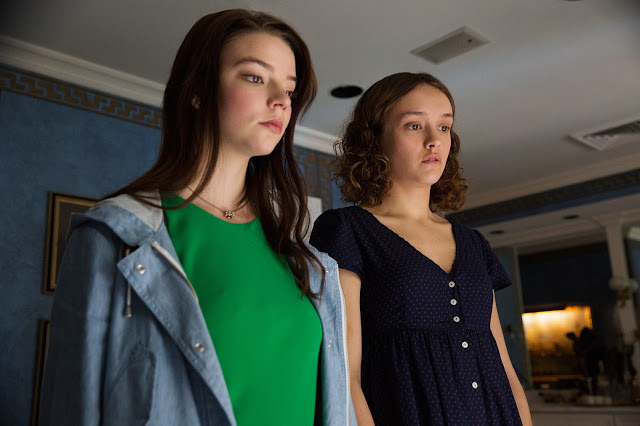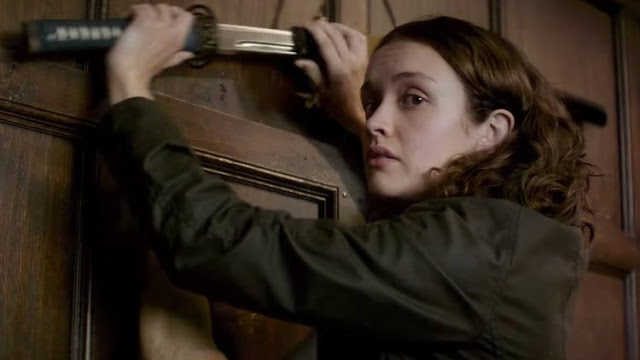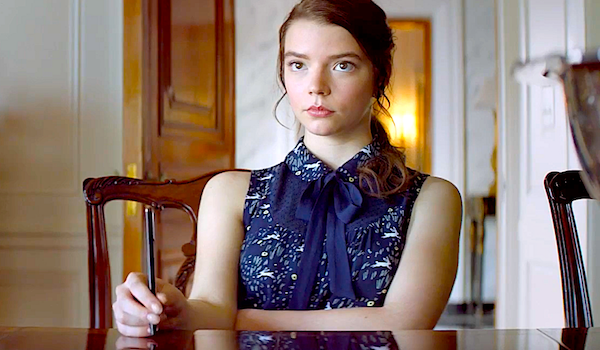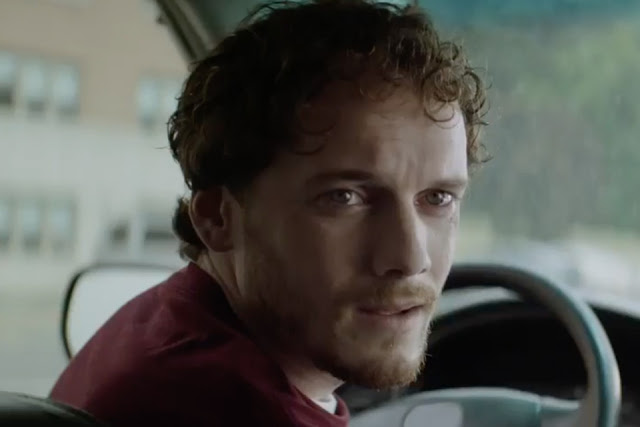It is an exhilarating feeling, watching the work of a first-time director who operates with absolute confidence, with an imperceptible clarity of vision. As someone who’s only been going to the movies for a few decades, I’ve felt that sensation just a handful of times—during personality-fueled debuts like Brick, Being John Malkovich, and Michael Clayton—but I like to imagine that the cinephiles of yesteryear experienced something similar when they wandered into the theater and settled themselves for a screening of The Maltese Falcon or The 400 Blows or Blood Simple. I felt stirrings of it watching Thoroughbreds, the bold and provocative first feature from writer-director Cory Finley. I have no idea where Finley’s career will take him; maybe he’ll ascend, maybe he’ll flame out. I do know that with this impossibly gripping movie, he’s made one hell of an entrance.
Speaking of entrances, Thoroughbreds begins with a doozy, a short and sharp cold open that instantly announces its seriousness of intent as well as its formal rigor. We open with a direct shot of a horse, its alien snout practically poking through the screen, before turning to the face of a teenage girl, regarding the animal with a mixture of curiosity and indifference. The lighting is dark, the mood eerie, so by the time the camera reveals a large, glittering knife, our nerves are already on edge.
Cover your eyes! Actually, don’t, and not just because you would be depriving yourself of some exquisite filmmaking. There’s no need to be squeamish; Finley may be merciless in his control, but he isn’t a sadist, and he understands the power of suggestion. The twin specters of pain and death haunt Thoroughbreds, but all of its ugliness takes place offscreen; the only moments of physical violence that we actually witness involve a half-comical punch to the jaw and a well-timed blow with a lamp. In fact, although it’s indecently suspenseful and unpredictable, the movie is too fluid and amorphous to be classified as a strict thriller. It is also, among other things, a coming-of-age drama, a biting satire, a twisted love story, and—perhaps most recognizably—a quirky teen comedy.
It is the last of these genres that ostensibly powers the film’s opening act, which follows the tentative, slow-building friendship between two very different girls. Our aforementioned horse-watcher is Amanda (Olivia Cooke, from Me and Earl and the Dying Girl), a filter-free sociopath who seems incapable of forming human emotions but who’s disturbingly adept in reading others’ feelings. The scion of a presumably wealthy family (her parents are barely seen, but they own horses, don’t they?), Amanda is receiving SAT tutoring from Lily (Anya Taylor-Joy, skyrocketing), a clean-cut straight-A student whose personality is wound as tight as her ponytail. It’s a study in opposites, right?
Don’t be so sure. One of the pleasures of Thoroughbreds is the way it plays with audience expectations, veering toward familiar cinematic tropes at slightly off-kilter angles. Amanda, certainly, is an unsettling variation on a recognizable type, the unapologetic truth-teller with a lightning-quick mind and a dead-eyed stare. But Lily is trickier to pin down, and together, Finley and Taylor-Joy round her into something more complex than the typical repressed goody-two-shoes, the sweet-natured girl with the plastered smile. In one of the movie’s best and most cathartic scenes, Amanda—who can wield her incisive honesty with utter ruthlessness, and who justifies her frankness with the refrain of, “It’s only weird if you make it weird”—gooses Lily into unleashing her suppressed feelings, resulting in a cascade of blistering insults that, against all odds, bring these two mismatched misfits closer together.
The collision of these two personalities—both are forceful and intelligent, but in decidedly different ways—produces one of the stranger and more compelling relationships I’ve seen on screen. As Amanda and Lily spend more time together, watching classic movies or lazing about on their vast manicured lawns, they develop a peculiar intimacy that seems to vacillate across the teen-girl spectrum, flitting between affection, wariness, admiration, and hostility. They understand one another’s needs and impulses, but they never entirely embrace the other’s flaws, and that distance makes their quasi-friendship all the more intriguing.
The two lead actors play this dynamic beautifully, with extraordinary poise and nuance. As a virtual vampire, Cooke has the more satisfying role, and she nails Amanda’s performative quality, giving her relentless apathy a studied and heightened air. But it is Taylor-Joy’s slippery turn as Lily that truly tantalizes. Lily is an enigma, sometimes a naïf and sometimes a devil, and Taylor-Joy—as she previously illustrated in both The Witch and Split—has the dexterity to locate pockets of darkness and intensity in the character that somehow square with her more angelic traits. The only thing that scares you more than what someone might do to Lily is what Lily might do to you.
Or, rather, what she might do to her stepfather. Played with suitable detestability by Paul Sparks, he runs her mansion with an iron fist and a curt tongue, oozing menace with every clipped command and pointed glare. Lily responds to his casual cruelty with a veneer of politeness and obedience, but she secretly despises him, a hatred that Amanda—she who feels nothing but perceives everything—picks up on right away. So one night, as the girls are raiding the wine cellar and watching TCM, Amanda offhandedly makes what she deems a perfectly sensible suggestion: Why not just kill him?
Yes, Thoroughbreds is a movie about two precocious teenagers who decide to commit murder. If this strikes you as implausible, maybe it is, but the sheen of artificiality that coats the picture is actually one of its strengths. Real people don’t talk the way Amanda and Lily do, but their rhythmic dialogue carries with it the perfect degree of movieness, that slightly unnatural polish that makes their banter smart but not synthetic. And in general, Thoroughbreds proceeds not as a work of harsh realism but as a stylized noir in the vein of the classic films that Finley plainly adores.
“I’m a skilled imitator,” Amanda says, a confession of her human failings that doubles as a statement of her director’s talents. And to be sure, Finley is a careful student of the works of Hitchcock, Billy Wilder, and the Coen Brothers. Yet while the film’s poster flaunts it as “Heathers meets American Psycho”, there is something bracingly original about Thoroughbreds, which deftly blends comedy and drama without ever feeling like a hodgepodge. As a thriller, it’s expertly plotted, with multiple sequences of delicious tension. (A simple scene of one character drinking a cocktail is likely to induce gasps.) But it’s also very funny; the late and great Anton Yelchin shows up as a bumbling drug-dealer, injecting some anarchic energy that balances nicely against the protagonists’ steely precision, while the leads’ own interactions are routinely hilarious, as when Lily registers Amanda’s attempted hug as a sudden attack.
Yet even when it’s sidesplitting, Thoroughbreds remains a movie of unnerving steadiness. It’s only fitting that the film frequently returns to a discussion of The Technique—Amanda’s term for an actor’s ability to cry on cue—given that Finley himself proves to be a masterful tactician. His penchant for long, slow tracking shots evokes Michael Haneke and Yorgos Lanthimos, while his immaculate framing brings to mind Wes Anderson. But again, there is nothing recycled about Finley’s approach here. His tone is his own, in particular the way he conveys even basic exposition with visual panache; a scene where Amanda recounts to Lily her nightmarish exploits with the horse is made mesmerizing because she spends the entire single-shot sequence lugging around giant-sized chess pieces, maneuvering them into battle. Finley is great with sound, too; a moment where Lily submerges herself in water is breathtakingly quiet, while the metrical thrum of her stepfather’s rowing machine becomes the film’s scariest sonic effect. (The percussive score, by the cellist Erik Friedlander, is off-putting but appropriately discordant.)
It’s almost alarming how packed with style and how bristling with vitality this movie is, given that it’s a 90-minute feature with just a handful of characters and locations. But that simplicity only accentuates Thoroughbreds’ roiling dynamism, the way it serves as a stunning showcase for Finley’s craft and for Cooke and Taylor-Joy’s furiously watchable performances. In other words: It’s only great ’cause they make it great.
Jeremy Beck is the editor-in-chief of MovieManifesto. He watches more movies and television than he probably should.




